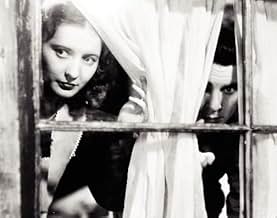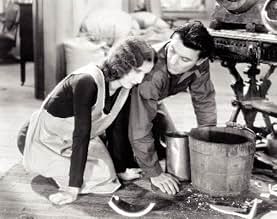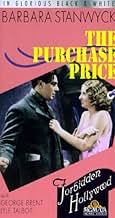Ajouter une intrigue dans votre langueA torch singer becomes a farmer's mail-order bride.A torch singer becomes a farmer's mail-order bride.A torch singer becomes a farmer's mail-order bride.
- Réalisation
- Scénario
- Casting principal
Mae Busch
- Queenie - Girl on Train
- (non crédité)
Nick Copeland
- Skins' Pal at Shivaree
- (non crédité)
Mike Donlin
- Tom Buchanan - Man at Shivaree
- (non crédité)
Harrison Greene
- Man in Hotel Lobby
- (non crédité)
Crauford Kent
- A.C. Peters - The Banker
- (non crédité)
Matt McHugh
- Waco - Fields' Henchman
- (non crédité)
John 'Skins' Miller
- Skins - The Accordion Player
- (non crédité)
Carlyle Moore Jr.
- Hotel Desk Clerk
- (non crédité)
Edmund Mortimer
- Dance Extra
- (non crédité)
William H. O'Brien
- Waiter in Opening Nightclub Scene
- (non crédité)
Henry Otho
- Extra in Beer Hall and at Shivaree
- (non crédité)
Avis à la une
The appeal of this somewhat run-of-the-mill film is Barbara Stanwyck in an early display of her mega-watt star power and her ability to turn mediocre material into something special.
Her character doesn't make much sense: a nightclub singer from the city who wants to get away from the bootlegger boyfriend hounding her and so agrees to an arranged marriage with a farmer up in the wilds of North Dakota! The bootlegger (played by Lyle Talbot) isn't threatening or abusive, so one wonders why Stanwyck needs to go to such great lengths to avoid him -- keep wondering, because the movie never explains it. But if you can swallow that, then you can easily swallow the fact that this urban good-time gal seems to know all about how to run a farm.
Which brings me back to Stanwyck. The movie's premise isn't remotely plausible, but Stanwyck somehow makes it so through the confidence of her performance. I really think she could make anything worth sitting through just for the pleasure of watching her.
The film does provide an interesting look at what farm life in the early days of the 1930s was like, a lifestyle I've only seen recreated in more modern-day movies.
Grade: B-
Her character doesn't make much sense: a nightclub singer from the city who wants to get away from the bootlegger boyfriend hounding her and so agrees to an arranged marriage with a farmer up in the wilds of North Dakota! The bootlegger (played by Lyle Talbot) isn't threatening or abusive, so one wonders why Stanwyck needs to go to such great lengths to avoid him -- keep wondering, because the movie never explains it. But if you can swallow that, then you can easily swallow the fact that this urban good-time gal seems to know all about how to run a farm.
Which brings me back to Stanwyck. The movie's premise isn't remotely plausible, but Stanwyck somehow makes it so through the confidence of her performance. I really think she could make anything worth sitting through just for the pleasure of watching her.
The film does provide an interesting look at what farm life in the early days of the 1930s was like, a lifestyle I've only seen recreated in more modern-day movies.
Grade: B-
She may be dressed down for the farm wife's part, but this is Stanwyck at her youthful loveliest. So, can Joan (Stanwyck) adjust to the rigors of rural life after the glamor of big city nightclubs. If you can buy her becoming a mail-order bride as an alternative, you might buy the rest. Seeing her city girl alone on the vast Canadian prairie, suitcase in hand, waiting for her intended, does present a stretch. Nonetheless, now she's got purpose in life, no longer just a meaningless rich man's ornament. I do wish Brent as her mail-order hubby showed a little charm, something that would help us believe she would stick with her new life. Instead, he's overly dour and insensitive, wanting to manhandle her on their wedding night. Getting the two in step with each other makes up the movie's main part.
The movie's quite good at showing the rigors of farm life—the primitive farm house, the constant grubby toil, the relative isolation. I expect Dust Bowl audiences could identify with these demanding aspects, especially when the bank threatens to repossess Jim's (Brent) farm. That Joan manages to stick it out and thrive suggests that behind city decadence lies a common humanity and hidden grit-- a good message for that time and maybe any.
Anyway, pre-Code doesn't disappoint as Stanwyck gets to show off fancy and not-so-fancy underwear. Then too, sleeping arrangements leave little in doubt. Note too, how little is done to prettify either the rough-hewn people or their lives, even though most are stereotypes. Also, I could have done without the barking idiot as comedy relief. All in all, this Warner Bros. antique (1933) remains a fairly interesting little programmer, with a humane underlying message.
The movie's quite good at showing the rigors of farm life—the primitive farm house, the constant grubby toil, the relative isolation. I expect Dust Bowl audiences could identify with these demanding aspects, especially when the bank threatens to repossess Jim's (Brent) farm. That Joan manages to stick it out and thrive suggests that behind city decadence lies a common humanity and hidden grit-- a good message for that time and maybe any.
Anyway, pre-Code doesn't disappoint as Stanwyck gets to show off fancy and not-so-fancy underwear. Then too, sleeping arrangements leave little in doubt. Note too, how little is done to prettify either the rough-hewn people or their lives, even though most are stereotypes. Also, I could have done without the barking idiot as comedy relief. All in all, this Warner Bros. antique (1933) remains a fairly interesting little programmer, with a humane underlying message.
If you stop to think about the actual story you'll realise that it's the most ridiculous thing you've ever seen. Fortunately William Wellman directs this at such breakneck speed you don't have time to stop - you're whisked along on the Wellman express.
That all this can happen in 68 minutes is crazy but this was Warner's specialty in the early thirties. They were brilliant at it and this is a great example. It's not a fantastic picture but it is so typical of those fast moving features of pure entertainment Darryl Zanuck knew his audiences would lap up. If good quality early thirties movies are your thing, this will tick your boxes. Even though the setting isn't the usual mean streets of New York, it's still got all the usual ingredients.
A common ingredient of pre-code films that's present in this is the overriding importance of marriage. Although in pictures like this it's the single most vital thing in the world for a girl - which must have reflected reality, it seems completely unimportant who they marry as long as they can provide food and shelter. It's irrelevant whether he's a gangster, a decrepit pensioner or in this case, a complete stranger who advertised for a wife (essentially a housekeeper) in an agency. Disturbingly, mail order brides are still around today. Anyway...
One of those other usual key ingredients is George Brent. He's his usual dull self but for a change, that bland personality is suited to this role. Fortunately 'the other man' in the love triangle is Lyle Talbot who always adds some slightly shady charisma. These two however are definitely second fiddle to the absolute star of this picture, Barbara Stanwyck.
She effortlessly melds her gangster-moll persona to devoted farmer's wife as though it's the most transition in the world. Were this role be played by a lesser actress (and directly a lesser director) it could have been a joke picture because the premise is so stupid but she (and Wellman) make it seem completely believable and therefore thoroughly enjoyable.
As in all her thirties pictures (apart from the monstrous Stella Dallas) despite not having the classic Hollywood looks, she inexplicably oozes enough sex appeal to fuel the planet for a hundred years. She certainly had 'it.' This isn't one of her best films but it's still pretty decent - and she's absolutely lovely in it.
That all this can happen in 68 minutes is crazy but this was Warner's specialty in the early thirties. They were brilliant at it and this is a great example. It's not a fantastic picture but it is so typical of those fast moving features of pure entertainment Darryl Zanuck knew his audiences would lap up. If good quality early thirties movies are your thing, this will tick your boxes. Even though the setting isn't the usual mean streets of New York, it's still got all the usual ingredients.
A common ingredient of pre-code films that's present in this is the overriding importance of marriage. Although in pictures like this it's the single most vital thing in the world for a girl - which must have reflected reality, it seems completely unimportant who they marry as long as they can provide food and shelter. It's irrelevant whether he's a gangster, a decrepit pensioner or in this case, a complete stranger who advertised for a wife (essentially a housekeeper) in an agency. Disturbingly, mail order brides are still around today. Anyway...
One of those other usual key ingredients is George Brent. He's his usual dull self but for a change, that bland personality is suited to this role. Fortunately 'the other man' in the love triangle is Lyle Talbot who always adds some slightly shady charisma. These two however are definitely second fiddle to the absolute star of this picture, Barbara Stanwyck.
She effortlessly melds her gangster-moll persona to devoted farmer's wife as though it's the most transition in the world. Were this role be played by a lesser actress (and directly a lesser director) it could have been a joke picture because the premise is so stupid but she (and Wellman) make it seem completely believable and therefore thoroughly enjoyable.
As in all her thirties pictures (apart from the monstrous Stella Dallas) despite not having the classic Hollywood looks, she inexplicably oozes enough sex appeal to fuel the planet for a hundred years. She certainly had 'it.' This isn't one of her best films but it's still pretty decent - and she's absolutely lovely in it.
This is sold as "pre-Code," as if there will something risqué or shocking, but certainly by today's standards -- or lack thereof -- and even by those of the era, there is nothing to bother your grandma or even your (reasonable) preacher.
There is something, though, to excite the movie-lover: Barbara Stanwyck's performance.
Apparently in real life she was a pretty tough cookie, and certainly she played some hard women in many of her films.
In "The Purchase Price" her character refers to herself as having maintained some sort of a reputation and in fact she comes across as a very nice, even admirable person.
She certainly looked good, with a gentle strength, or strong gentleness, poking out of the chorus girl/mistress persona.
The story, though, never does make much sense, and why the people did what they did, except for the character played by Lyle Talbot -- in a great role for him, and excellently played -- is not clear.
One more glaring error: North (brrrr) Dakota doesn't have any hills, and the shots of snow-capped peaks showed that wherever this film was shot, it sure wasn't North (brrrr) Dakota, you betcha.
One scene of plowing showed the genuine agoraphobic look of that state, where neither hills nor even trees are native. Except for cottonwoods along the creeks and rivers, what trees there are in North (brrrr) Dakota have had to be brought in from the real world.
Plus North (brrrrr) Dakota drunks and brawlers are not Irish and Scots, as this movie implies, but Poles and Czechs and Germans, sometimes even Norwegians, unless they are Lutherans then, of course, they don't drink or brawl. And if you don't believe me, ask their preachers.
Anyway, watch this for Stanwyck and suspend your disbelief about all the rest. She is worth spending your time.
There is something, though, to excite the movie-lover: Barbara Stanwyck's performance.
Apparently in real life she was a pretty tough cookie, and certainly she played some hard women in many of her films.
In "The Purchase Price" her character refers to herself as having maintained some sort of a reputation and in fact she comes across as a very nice, even admirable person.
She certainly looked good, with a gentle strength, or strong gentleness, poking out of the chorus girl/mistress persona.
The story, though, never does make much sense, and why the people did what they did, except for the character played by Lyle Talbot -- in a great role for him, and excellently played -- is not clear.
One more glaring error: North (brrrr) Dakota doesn't have any hills, and the shots of snow-capped peaks showed that wherever this film was shot, it sure wasn't North (brrrr) Dakota, you betcha.
One scene of plowing showed the genuine agoraphobic look of that state, where neither hills nor even trees are native. Except for cottonwoods along the creeks and rivers, what trees there are in North (brrrr) Dakota have had to be brought in from the real world.
Plus North (brrrrr) Dakota drunks and brawlers are not Irish and Scots, as this movie implies, but Poles and Czechs and Germans, sometimes even Norwegians, unless they are Lutherans then, of course, they don't drink or brawl. And if you don't believe me, ask their preachers.
Anyway, watch this for Stanwyck and suspend your disbelief about all the rest. She is worth spending your time.
Of course this delicious tour-de-force is totally incredible... but WOW! You can't take your eyes off the screen in case Wellman gives his heroine whiplash as she moves from plushly-kept woman in Manhattan to mail-order farmer's bride in North Dakota. From take-out at Tiffany's to hauling coal nuggets 20 miles through a blizzard. From igniting the lust in men with her daring chanteusing to putting out the fire villains set to her and hubby George Brent's last-hope crop of wheat. All in just over 60 minutes!
Le saviez-vous
- AnecdotesDuring the wheat-burning scene a stand-in was used instead of Barbara Stanwyck, but she didn't think the stand-in acted as the character so Stanwyck decided to play it herself. This resulted in her getting some burns on her legs, but she never complained.
- GaffesWhen Barbara Stanwyck gets off the train in North Dakota the terrain is very mountainous. North Dakota is on the Great Plains - very flat.
- Citations
Eddie 'Ed' Fields: Ya daffy little tahmata, I'm bugs about ya. I'd marry ya myself, if I wasn't already married.
- ConnexionsFeatured in Barbara Stanwyck: Fire and Desire (1991)
- Bandes originalesTake Me Away
(1932) (uncredited)
Music by Peter Tinturin
Lyrics by Sidney Clare and Charles Tobias
Played during the opening credits and at the end
Sung by Barbara Stanwyck at the nightclub
Played as background music often
Meilleurs choix
Connectez-vous pour évaluer et suivre la liste de favoris afin de recevoir des recommandations personnalisées
- How long is The Purchase Price?Alimenté par Alexa
Détails
- Date de sortie
- Pays d’origine
- Langue
- Aussi connu sous le nom de
- Night Flower
- Lieux de tournage
- Société de production
- Voir plus de crédits d'entreprise sur IMDbPro
Box-office
- Budget
- 202 000 $US (estimé)
- Durée1 heure 8 minutes
- Couleur
- Mixage
- Rapport de forme
- 1.37 : 1
Contribuer à cette page
Suggérer une modification ou ajouter du contenu manquant

Lacune principale
By what name was The Purchase Price (1932) officially released in India in English?
Répondre


































